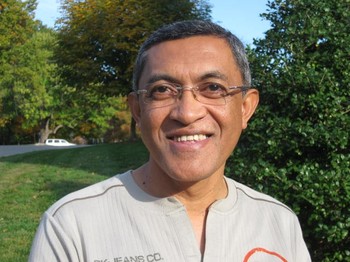Hubert Rakotoarivony is on the front lines of justice and peacemaking in Madagascar, where the Presbyterian Church particularly is being persecuted by the current government, he said.
“I am no longer in hiding,” said the Presbyterian pastor. Millions of people are dying slowly “because they are oppressed by those who did the coup” in 2009, he said.
“There is practically no law,” and natural resources are being exploited, Rakotoarivony said. “The work of the church in Madagascar … is that we denounce those wrongdoings. We speak out about those issues.”
That was just one of the messages Rakotoarivony shared during his time in the United States as one of the 2012 International Peacemakers of the Presbyterian Church (U.S.A.) Peacemaking Program.
The Peacemaking Program invites leaders from the denomination’s partner churches around the world to share their experiences as peacemakers in their own lands. This year, 15 International Peacemakers were available to mid-councils, Presbyterian colleges and seminaries for itineration Sept. 21-Oct. 15.
Rakotoarivony spent time visiting churches, schools and other venues to share how justice and peacemaking are unfolding in Madagascar and to come alongside his fellow Presbyterians here in the states.
He said among the highlights of his visit was sharing at Hastings College, Creighton University and the University of Omaha, all in Nebraska.
“It was uplifting because of some of the impressions from those who attended” the talks, said Rakotoarivony, who lives in Madagascar’s capital city of Antananarivo. In the United States, speaking as a Christian is becoming more and more difficult, and many shared that “I was so courageous about talking openly about my faith.”
In addition to serving a church in Madagascar, Rakotoarivony teaches at a college and a seminary. He also chairs church commissions, including one that deals with peacemaking and social justice.
As he shared about his own work, Rakotoarivony said he felt a connectedness with U.S. Christians, and especially is praying for the PC(USA) as it goes through challenges.
“Many Presbyterian pastors are struggling, going through some sort of depression,” he said. “The Presbyterian church whom we have a partnership with is struggling.”
The Presbyterian Church needs to accept that, but also to know that there is hope, Rakotoarivony said. His aim was to bring in new life as a result of his presence and to “open up people’s minds and give them new hope again that God is still alive,” he said.
Rakotoarivony also encouraged those he spoke with to stay in communication with him via Facebook and on Twitter. “We need to feel the human connectedness.”
And, all need to know without a doubt that “God is still on the throne,” he said.
Toya Richards, a student at Louisville Presbyterian Theological Seminary, writes frequently for Presbyterian News Service.

